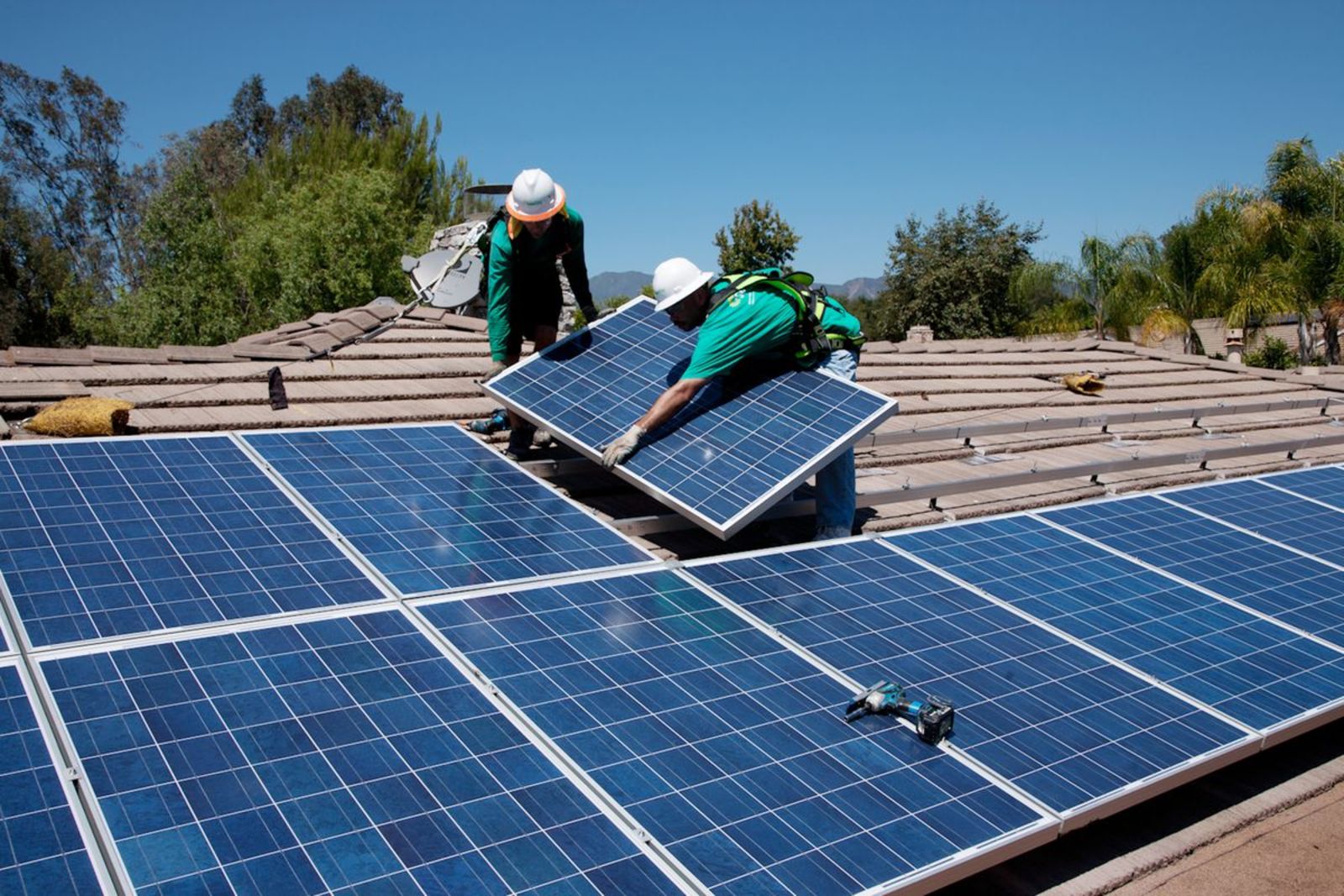
The barriers to small-scale solar adoption in Egypt

The challenges of small-scale solar in Egypt: Though it could be possible for some small businesses and households to break even on solar panels within four to five years, the high costs and the lack of space prohibit many in Egypt’s dense urban neighborhoods from tapping the sun’s rays, industry experts tell Enterprise.
The costs are prohibitive for many: Installing a solar system is a long-term investment that comes with a big-ticket upfront cost. It can cost anywhere between EGP 65k and upwards of EGP 250k for small-scale consumers to make the switch to solar, industry players say.
Net metering and feed-in tariffs could improve the economics: Net metering and feed-in tariffs allow residential and commercial consumers to sell excess electricity generated back to the national grid, allowing them to offset the cost of electricity bills and shortening the time it takes to break even.
But tariffs don’t pay out much: Under the FY 2021-2022 net metering tariff structure, households and businesses can make only EGP 1.0288 per kWh and EGP 1.0858 per kWh respectively selling power back to the grid.
Urban planning presents a challenge: Heavily built-up neighborhoods lack sunlit areas and satellite dishes take up a lot of rooftop space, making it nearly impossible to install solar stations for individual apartments and shops, KarmSolar CEO Ahmed Zahran tells Enterprise.
And you need to own your property to go solar: Currently, the law doesn’t allow the installation of rooftop solar panels unless you own the building or get the backing of the building’s homeowner association.
All of this means that rooftop solar adoption remains low: In the eight years since the government introduced the net metering scheme, just 749 rooftop units have been installed around the country, according to the Economist.
Some in the industry say that the break-even point doesn’t have to be years in the future: “It’s a misconception that solar energy installation is too expensive and the payback period is too long,” says Hend Farouh, the national project manager at Egypt-PV, a government-run program funded by the UN and the Global Environment Facility (GEF) that helps households and SMEs switch to solar. “We see payback periods end within four to five years in some sectors.”
Rising electricity bills provides an incentive to switch: The government’s decision to phase out subsidies back in 2016 has significantly increased electricity bills for households and businesses, improving the long-term cost-effectiveness of solar generation. Residential bills are expected to rise by another 21% next year.
And some households are willing to bite the bullet for a more reliable power supply: “Where I live, the electricity swings between 150 and 270 watts throughout the day, which can destroy electrical appliances,” one homeowner tells us. “I installed a rather large system on my land, so our electric bills have been reduced drastically almost to zero — but it cost me up to EGP 250k.”
Finance can soften the blow: National projects like Egypt-PV and development loans can make it easier for households and businesses to shoulder the upfront costs of installing solar. Through Egypt-PV, residential and commercial consumers can pay up to 25% less for solar systems, while on-lending programs by multilateral lenders like the European Bank for Reconstruction and Development (EBRD) have given SMEs access to finance to cover the costs of adopting greener technologies. Since its launch in 2018, Egypt-PV has helped install 132 solar systems producing 12.5 MW of electricity, Farouh tells us.
Some say more incentives are needed: “The VAT on solar installation is currently either 5% or 14% depending on the industry sector plus a 5% contractors tax, so lower taxes and tariffs on solar could incentivize businesses to make the switch,” Cairo Solar Managing Director and Solar Energy Development Association (SEDA) spokesperson Hatem Tawfik says.
Some providers are helping consumers make the switch. SolarizEgypt is absorbing the upfront costs for its customers and installs the system without charge, says the company’s founder and managing director, Yaseen Abdel Ghaffar. “Let’s say your current bill is EGP 2k [per month]. We'll bill you EGP 2.2k for five years and at the end of the five years, you’ll get 20 years of free power.”
Can communities club together to bring solar to the whole neighborhood? To supply whole areas with electricity from a dedicated solar station, a private sector solar company needs permits from the Egyptian Electricity Regulatory Agency (Egyptera) for power distribution and agreements from all the people in the participating area. That’s what some Marsa Alam hotels and resorts have done, entering into an agreement with KarmSolar to build the Marsa Alam Solar Grid which now supplies hotels, shops and some residential meters. “When you get a permit to do power distribution in a certain area, you are required to distribute to that entire region regardless of whether it’s residential or commercial,” Zahran says.
Looking forward, some are calling for legislation to ease the onboarding process and distribute solar energy within a building. “It's 100% a legislative issue. There are technical solutions that allow for a single solar system on top of a building with different meters for each person to access cheaper green electricity, but we're not able to do it because of the way the legislation is built,” says Abdel Ghaffar.
Next week: We’ll take a look at how real estate developers, multinational corporations, and resort towns are turning to solar energy for cost effective and energy efficient operations.
Your top green economy stories for the week:
- Nile cleanup initiative VeryNile built “the world’s largest plastic pyramid” to mark World Cleanup Day on Saturday, using 225k compressed plastic bottles collected by 60 fishermen. (Statement)
- The European Investment Bank could lend EUR 100 mn to the Environmental Affairs Agency for on-lending to public and private industrial companies to green their manufacturing processes.
- Putting the climate crisis into perspective: We sat down with UN high-level climate champion Mahmoud Mohieldin.
Enterprise is a daily publication of Enterprise Ventures LLC, an Egyptian limited liability company (commercial register 83594), and a subsidiary of Inktank Communications. Summaries are intended for guidance only and are provided on an as-is basis; kindly refer to the source article in its original language prior to undertaking any action. Neither Enterprise Ventures nor its staff assume any responsibility or liability for the accuracy of the information contained in this publication, whether in the form of summaries or analysis. © 2022 Enterprise Ventures LLC.
Enterprise is available without charge thanks to the generous support of HSBC Egypt (tax ID: 204-901-715), the leading corporate and retail lender in Egypt; EFG Hermes (tax ID: 200-178-385), the leading financial services corporation in frontier emerging markets; SODIC (tax ID: 212-168-002), a leading Egyptian real estate developer; SomaBay (tax ID: 204-903-300), our Red Sea holiday partner; Infinity (tax ID: 474-939-359), the ultimate way to power cities, industries, and homes directly from nature right here in Egypt; CIRA (tax ID: 200-069-608), the leading providers of K-12 and higher level education in Egypt; Orascom Construction (tax ID: 229-988-806), the leading construction and engineering company building infrastructure in Egypt and abroad; Moharram & Partners (tax ID: 616-112-459), the leading public policy and government affairs partner; Palm Hills Developments (tax ID: 432-737-014), a leading developer of commercial and residential properties; Mashreq (tax ID: 204-898-862), the MENA region’s leading homegrown personal and digital bank; Industrial Development Group (IDG) (tax ID:266-965-253), the leading builder of industrial parks in Egypt; Hassan Allam Properties (tax ID: 553-096-567), one of Egypt’s most prominent and leading builders; and Saleh, Barsoum & Abdel Aziz (tax ID: 220-002-827), the leading audit, tax and accounting firm in Egypt.